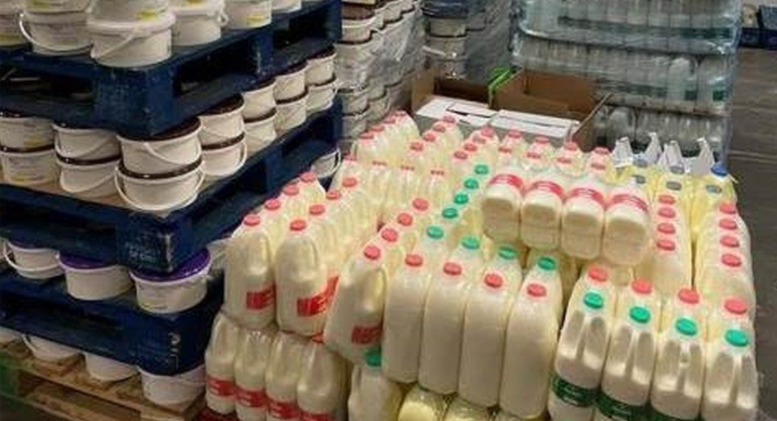The boss of Creed Foodservice is one of many firms facing potentially having to throw away food after schools suddenly closed to most pupils this week.
The blow came after firms ordered extra stock to accommodate any supply disruption ahead of new Brexit rules.
Wholesalers have also been hit by restaurants and pubs closing again.
Mr de Ternant says local charities he has spoken to have enough milk. “We have had a word with a few food banks. If I can’t give it to anyone, it will be dumped.”
It’s part of about £50,000 of now unwanted chilled stock his firm must deal with in the next month. Since April, he’s had to write off £150,000 of food
About 35% of his custom comes from schools, hospitals and care homes. The balance usually comes from hospitality firms like restaurants and cafes, most of which have closed.
And when schools closed, his business often heard that orders had been rejected as his drivers pulled up to the gates.
While wholesaler customers can order one day for the day after, businesses like his must have stock on hand to deliver and make orders weeks in advance. This has left them in the lurch when it comes to sudden changes in policy, they say.
‘Big fear’
And while customers can cancel orders at late notice, wholesalers must still pay large electricity bills for chillers, and rent on warehouses and vans.
He says he and his competitors also offer credit, allowing customers to pay 30 to 45 days after delivery.
“One of the biggest fears for foodservice is, of our clients we delivered to in November and December, how many will pay us in January?”
During the first lockdown, Mr de Ternant’s firm was able to sell some stock to shoppers who were struggling to make orders online or who were facing empty supermarket shelves, he says.
But now, supermarkets have adjusted their buying and there are fewer shoppers interested.
Mike Morgan, managing director of Savona Foodservice, based in Oxfordshire, said the school closures threaten about a quarter of his company’s turnover, which is usually about £30m a year.
While sales have collapsed, his costs have not. He’s been able to furlough some of his workers and he and Mr de Ternant praised the scheme.
“Furlough helps dramatically but we are a high fixed cost low margin business,” he said. “All these costs have to be borne and I’d be better off shutting my doors.”
But if he does, that could harm hospitals and care homes, and at best he will lose clients, he said.
No notice
Both bosses said their own suppliers, including landlords and vehicle leasing companies, have offered some assistance, but it’s largely delays in payment rather than discounts.
Their companies are relying on reserves while they book hefty losses.
Darren Labbett, who runs Woods Foodservice, which mainly serves upmarket restaurants and venues, has seen his business drop by up to 90%.
“Every lockdown our turnover drops overnight,” he said. “The notice you get is none at all.”

He says he is particularly frustrated that all his clients receive tax relief in the form of a business rate holiday.
Tax plea
In March, Chancellor Rishi Sunak announced that England’s retail, leisure and hospitality firms with a rateable value of less than £51,000 will be eligible for the tax holiday for a year.
All three bosses said a holiday from business rates for a year would help their businesses cope with the losses they are making. They also requested more notice ahead of lockdowns.
“Every single one of my clients got rate relief so it would make sense for us to get it as well,” says Mr Labbett. “It wouldn’t cover all the losses but it would take off the pressure.”
He says he became so angry about the disparity – particularly as supermarkets were offered the help, which they could afford to return – that he wrote to his local MP, who happens to be Prime Minister Boris Johnson, threatening not to pay the tax, worth £118,000 a year.
He expects a surgery appointment with Mr Johnson later this month and says he has been told his concerns have been shared with the government.
“All I want is parity,” says Mr Labbett. “If this carries on much longer we will struggle to survive.”
James Bielby, chief executive of the Federation of Wholesale Distributors, said: “Despite being incredibly resourceful in helping their hospitality customers transform their businesses to create new offers for the public, such as home delivery, many regional wholesalers are running out of money and time.”
A Treasury spokesperson said support for businesses could be reviewed in March.
“We’ve taken swift action throughout the pandemic to protect lives and livelihoods, and this week’s cash injection will ensure we continue to support businesses and jobs through to the spring,” a Treasury spokesman said.
“We’ve already extended the furlough scheme until April, providing certainty for businesses as they navigate the months ahead.
“And we’ll have a Budget in early March to take stock of our wider support, and set out the next stage in our economic response.”
Downing Street declined to comment.



